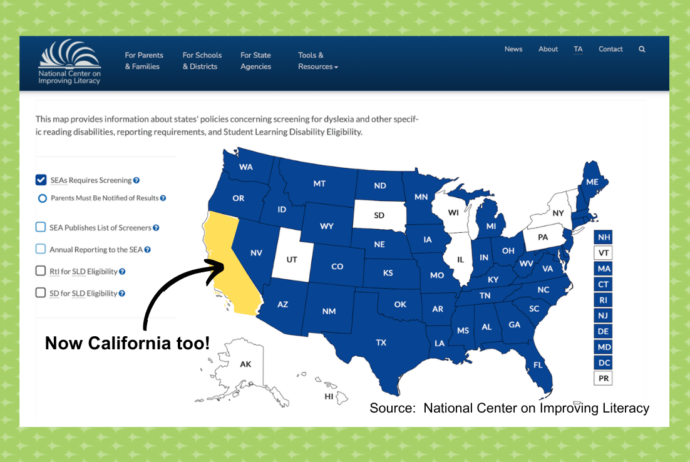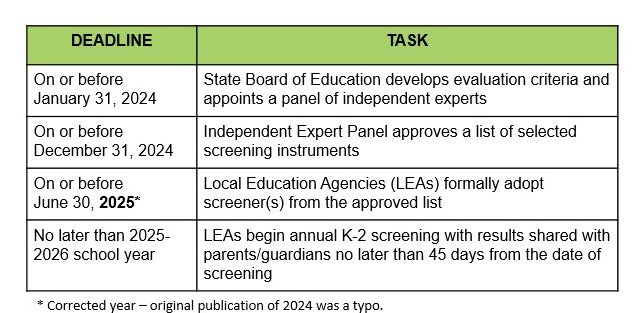Background:
Research from multiple scientific studies is unequivocal: early identification and intervention improves literacy outcomes for students at risk of or with dyslexia and other struggling readers. K-2 universal screening makes system-wide early intervention possible and is the first step in closing academic gaps, before students fall behind.
It has taken time to raise awareness in California on the role early, universal screening can play in addressing literacy outcomes. California currently does not require any statewide testing of reading until the spring of third grade. Unless a school district voluntarily adopts universal screening, utilizing a valid and reliable screening instrument, schools have very little evidence-based information on the acquisition of early literacy skills that are highly predictive of future reading outcomes. Even worse, some school districts rely on early reading assessments that are not supported by research. Even if a school district does already provide evidence-based screening, they may not be sharing screening results with parents and guardians.
Decoding Dyslexia CA (DDCA) has been trying to change this for several years, and momentum has built slowly over time. Many people were shocked when they learned California is behind the majority of states in not requiring screening for students with reading difficulties in the early grades, when the evidence of its importance is so strong. As of today, 40 states have legislation on universal screening for risk of dyslexia.
The national discussion and media attention on early literacy has helped get this current legislation passed, including highlighting the voices of teachers and parents who said we need to be doing this and schools aren’t doing this or aren’t doing it in ways aligned with evidence.
California History on Screening Legislation:
DDCA has been advocating for legislation on this issue since 2015 when Assembly Bill 1369 (Frazier), which DDCA sponsored, was introduced. AB 1369 ultimately passed, resulting in the creation of the (non-mandated) California Dyslexia Guidelines; however teacher training and screening for risk of dyslexia were removed from the bill via amendments. As an aside, Assemblymember Jim Frazier shared publicly years later that he has dyslexia.
Universal screening for risk of dyslexia was then re-introduced in 2020, in Senate Bill 1174 by Senator Anthony Portantino, with DDCA and EdVoice as co-sponsors. Senator Portantino has dyslexia. When the COVID pandemic began, the Senator agreed to pull SB 1174 as only COVID-related bills were being heard in the California Legislature.
In 2021, Senator Portantino introduced Senate Bill 237, with DDCA and EdVoice as co-sponsors. The bill passed unanimously through the Senate. However, it was, held up in the Assembly Education Committee, when the past Committee Chair refused to schedule it for hearing. As a result, SB 237 died in Committee without ever having a hearing.
In 2023, Senator Portantino introduced Senate Bill 691, again with DDCA and EdVoice as co-sponsors. This legislative session Senator Portantino was able to get 33 legislators to sign on as co-authors of SB 691. The co-authors included a bipartisan and diverse group representing both urban and rural districts. It was the most co-authorship of any bill introduced this legislative session. We were also able to garner support of over 50 organizations. Senator Portantino’s leadership in the legislature was important in moving the bill forward. In April of 2023, California State Parent Teachers Association, a supporting organization, voted to join us as an additional bill co-sponsor of SB 691. In April of 2023, we also received a letter of support from State Superintendent of Public Instruction, Tony Thurmond. Momentum was definitely building!
Governor Newsom and his staff began discussions with Senator Portantino, DDCA, and EdVoice about making universal screening for reading difficulties, including risk of dyslexia, a priority in the Governor’s May 2023 revision of the proposed budget.
At this point, SB 691 would have been duplicative to the Governor’s May budget revisions, which would now include mandated K-2 annual universal screening. Having the Governor’s support was critical in moving this legislation forward. The Governor’s support really was the difference maker and it led to important discussions about how to make K-2 screening for reading difficulties, including risk of dyslexia, culturally and linguistically appropriate to meet the needs of California’s diverse population.
On July 10, 2023, Governor Newsom signed the Education Omnibus Budget Trailer Bill (Senate Bill 114) which included K-2 universal screening for reading difficulties, including risk of dyslexia.
What is Covered by New Legislation (SB 114) regarding K-2 Screening?
DDCA has provided the excerpted text from Education Omnibus Budget Trailer Bill (SB 114) regarding K-2 Universal Screening that was signed into law. The full text of SB 114, can be found here.
The bill provides $1 million for the State Board of Education to develop evaluation criteria and create an expert panel to approve a list of culturally, developmentally, and linguistically appropriate screening instruments. Evaluation criteria shall consider guidance and resources for educators regarding how to administer screening instruments, interpret results, explain results to families, including in students’ primary languages, and determine further educational strategies, assessments, diagnostics, and interventions that should be considered and that are specific to each type of student result. Guidance and resources shall be informed by the English Language Arts/English Language Development Framework for California Public Schools and the California Dyslexia Guidelines, as well as knowledge of effective interventions for the specific needs of individual students, and shall reflect a tiered interventions model aligned with the Multi-Tiered Systems of Support.
Local Education Agencies will need to select from the approved list of screeners and will have until no later than the 2025-2026 academic year to begin annual screening of all pupils in Kindergarten, Grade 1 and Grade 2. Parents/guardians will receive the results of the screening including information on how to interpret the results and the proposed supports and services for children identified as “at risk”. Proposed supports and services appropriate to the specific challenges identified by the screening instrument and other pertinent information about the student, which may include, among other supports and services, any of the following:
(1) Evidence-based literacy instruction focused on the pupil’s specific needs
(2) Progress monitoring
(3) Early intervention in the regular general education program
(4) One-on-one or small group tutoring
(5) Further evaluation or diagnostic assessment
Parents/guardians can also opt out if they do not want their child screened. The bill has provisions for alternate procedures for English Learners who do not speak sufficient English to be screened using an English-language screening instrument.
Next steps:
Screening is a first step, which makes systemic early intervention possible. DDCA acknowledges more needs to be done to ensure administrators and teachers have the knowledge and support necessary to implement effective systems for early intervention, so that every child has access to the instruction they need to achieve literacy. This is where ongoing state-funded initiatives can play a key role.
This new screening requirement should be combined with ongoing state initiatives to help provide additional resources and infrastructure to school districts for improving literacy outcomes. Governor Newsom has provided approximately $40 million in past funding to UCSF Dyslexia Center, which is developing screeners in multiple languages that, when released, will be available for free to all school districts in California. California’s screening and follow-up supports should value the cultural and linguistic assets of our state’s diverse student population and our state has the opportunity to be a leader in implementing screening practices that support our multilingual learners.
Governor Newsom has also provided $4 million in past funding to create the California Dyslexia Initiative, administered by the Sacramento County Office of Education, to build capacity and resources across California’s educational systems to address the needs of struggling readers and students with dyslexia. The Governor created the UC/CSU California Collaborative for Neurodiversity and Learning with $6 million in past state budget funding and the goal of bringing together leading experts in brain research and K-12 education to strengthen educational support and new teaching methods for children with diverse learning needs, including children with dyslexia and literacy issues.
DDCA has been involved in strengthening teacher preparation in California for years, and we view this work as additive to the successful implementation of universal screening across the state. As a result of Senate Bill 488, passed in 2021, California’s teacher preparation programs have new and improved literacy standards so that future teachers will be equipped with the knowledge and skills necessary for improving early literacy outcomes. More specifically, pre-service teachers will receive training in screening students for reading difficulties, including risk of dyslexia, and implementing structured literacy in the classroom. The new literacy standards also require that teacher preparation incorporate the California Dyslexia Guidelines so that new teachers are better prepared to meet the needs of students with or at risk for dyslexia.
In addition, $500 million of state grant funding has been allocated for Literacy Coaches and Reading Specialists (LCRS) between last year’s and this year’s budgets. Ensuring that this funding goes to evidence-based literacy practices and that it is tied to improved literacy data is key. DDCA was encouraged that a requirement was added in this year’s Omnibus Education Budget Trailer bill for an independent evaluation of this grant program. As a state, we cannot afford to continue to fund failed literacy practices and continue with the status quo.
In the past, these various state-led literacy initiatives have tended to be siloed. This universal screening requirement, that will impact all California school districts, is a big step forward. As districts will soon have valid and reliable information on how students are performing, based on screening results, DDCA wants to see state leadership take an active role in requiring that districts use this information to improve evidence-based instruction. This is an opportunity for state leaders to insist on collaboration across existing and future literacy initiatives. We must do better for California children and getting reliable information about how our kids are doing in their early literacy development, in the hands of teachers and parents/guardians, is a critical change agent.



